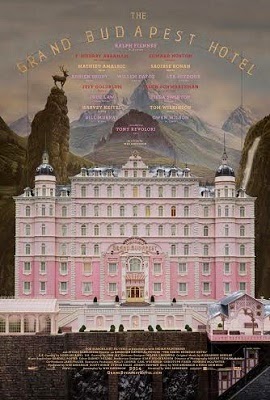Opening this week:
The Grand Budapest Hotel--Wes Anderson’s latest is set in another of his seamlessly-imagined alternative realities. This time, it’s a fortress-like resort hotel in a mountainous eastern-European nation. At the core of a couple of nesting-doll-like frame stories, the main action concerns the adventures of the Grand Budapest’s hapless but unflappable concierge Gustave H. (Ralph Fiennes) and his sidekick, the neophyte lobby-boy Zero Moustafa, charmingly played by Tony Revolori as a boy. F. Murray Abraham plays Zero’s older self, telling the story in the 1960s to a young writer (Jude Law) staying at the now-shabby hotel.
Gustave sees his duties as including gigolo services to the hotel’s wealthy, elderly—in some cases octogenarian—female guests. When he is implicated in the murder of one of these ladies—who has left him an impressive legacy—he and Zero are chased across “Zubrowka” by the sinister agent (Willem Dafoe) of her rotten son (Adrien Brody).
This is, I think, about as simply as the plot can be explained. There are dozens of characters, all manner of intrigues, subplots, chases, gun battles, romances, delicious-looking baked goods, and eccentric characterizations by a cast that includes Tilda Swinton, Jeff Goldblum, Bill Murray, Harvey Keitel, Saoirise Ronan, Bob Balaban, Edward Norton, Mathieu Amalric, Jason Schwartzman and others, all in good form. Fiennes gives maybe his funniest and most endearing performance. It’s the usual Anderson shtick, and if, like me, you buy into his visions, you’ll probably find The Grand Budapest Hotel a delight.
Or mostly a delight, anyway. Grand Budapest is slightly marred, or at least was marred for me, by odd touches of violence—fingers severed by a sliding door, prison guards massacred during an escape, a casually murdered pet—that feel jarringly out-of-key with the general atmosphere of stylized whimsy. Other Anderson films have shown this trait—the arrow killing the dog in Moonrise Kingdom, for instance, or the fatal helicopter crash in The Life Aquatic with Steve Zissou. I’ve always guessed that it’s Anderson trying to force some dramatic gravity into his fictions, to keep them from seeming too trivial.
He probably felt even more pressure in this direction with The Grand Budapest Hotel, because of the setting and the period. On the whole, Europe in the mid-20th Century was no picnic, and since there are no Nazis or Fascists in the movie, the gruesome touches in The Grand Budapest Hotel may have been the director’s attempt to reassure the audience (especially its older members) that he knows this.
But this doesn’t seem any more substantial than anything else in the film—just less good-natured. F. Murray Abraham’s magnificent voice, narrating from weary decades later, carries all the poignant melancholy the movie needed to offset its lightness. The Grand Budapest Hotel is the work of mature master confectioner; its violence seems self-consciously scribbled on its surface, by Anderson’s adolescent inner vandal.
Raze—Violence is also the issue in this exploitation melodrama, opening today and playing this week at Filmbar Phoenix. It stars the marvelous actress and stuntwoman Zoe Bell, best known for Tarantino’s Death Proof, as Sabrina, one of a bunch of women who have found themselves abducted and imprisoned in an underground bunker and forced to fight each other, mano a mano, to the death, in an elimination tournament.
They’re told that if they die, their loved ones will be murdered, and the survivors are shown videos to prove it. Running this vile spectacle is a husband-and-wife team (Doug Jones and Sherilyn Fenn) of unctuous sickos; the audience, watching on video monitors, are rich scumbags.
I sat there watching this film, directed by Josh C. Waller from a script by Robert Beaucage, wondering why it seemed so toxically more vicious than innumerable action films with very similar premises, in most of which the combatants were male—just last year, for instance, I enjoyed the Keanu Reeves-directed Man of Tai Chi, the plot of which, in bare outline, is close to identical. Was my reflexive revulsion to Raze just cultural Victorianism because the cast was distaff?
It can’t have been only that, because while I don’t much like the Hunger Games flicks, which also employ this idea and a warrior heroine, I’m not appalled by them in the same way I was by this film. Perhaps it’s because the fight scenes in Raze are so furiously savage and concentrated, and the actresses—among them Tracie Thoms, Bell’s costar from Death Proof—give off a despairing sense of empathy for the opponents they have little choice but to pummel. Anyway, while I found the first two-thirds of Raze more grueling than fun, it doesn’t seem fair to censure a movie for making hideous violence seem hideous.
Based on this description, your own tastes should tell you if Raze is for you. I wouldn’t quite call it torture porn, but it carries some of that genre’s dismal stink. In any case, on its own terms, it’s effective. When (spoiler alert!) Sabrina at last gets around to some vengeance against her captors, I can’t claim I’m sufficiently pure-hearted not to have enjoyed it.
Subscribe to:
Post Comments (Atom)




No comments:
Post a Comment